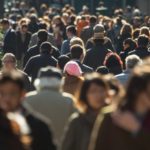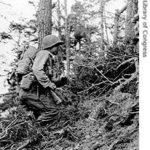By BRETT ZONGKER
Associated Press
WASHINGTON (AP) _ From the nation’s capital to a Georgia mountain carved with a Confederate memorial, church bells and hand bells served to answer Dr. Martin Luther King’s call from 50 years ago to “let freedom ring” for all people.
That symbolic sound could be heard Wednesday at more than 300 locations in nearly every state to commemorate King’s 1963 “I Have a Dream” speech at the moment it was delivered, organizers said.
At the Lincoln Memorial, members of the King family tolled a bell at 3 p.m. that once hung at the 16th Street Baptist Church in Birmingham, Ala., before the church was bombed in 1963.
Across the city, the central bell tower at the National Cathedral played “Lift Every Voice and Sing,” “We Shall Overcome,” and other songs at the site where King delivered his last Sunday sermon in 1968 before he was assassinated in Memphis, Tenn.
When the bells started playing, a group of women who gathered for shelter from the rain all stood up, and some hummed along. Carin Ruff, 48, of Washington, said a tear came to her eye as she heard the bells and at the same time listened to President Barack Obama speaking from her smartphone.
Patty Mason, 69, of Bethesda, Md., gazed up at the bell tower and remembered the March on Washington from 1963.
“I remember 50 years ago: the marching, the throngs of people, the speech, the energy,” said Mason, who was one of about two dozen people who gathered outside the cathedral, gazing up at the bell tower. “It was amazing, just amazing.”
At the same time, commemorations were taking place from New York City to the far reaches of Alaska, where participants rang cow bells and bear bells in Juneau.
The bells were answering King’s closing refrain from 1963. As he was wrapping up his speech at the Lincoln Memorial, he quoted from the patriotic song, “My Country `tis of Thee” and implored his audience to “let freedom ring” from the hilltops and mountains of every state in the nation. He cited some by name.
“When we allow freedom to ring _ when we let it ring from every city and every hamlet, from every state and every city, we will be able to speed up that day when all of God’s children, black men and white men, Jews and Gentiles, Protestants and Catholics, will be able to join hands and sing in the words of the old Negro spiritual, `Free at last, free at last, great God almighty, we are free at last,” King said in closing.
One of the places King cited was Georgia’s Stone Mountain, a granite outcropping east of Atlanta. The park is a memorial to the Confederacy, including a 17,000-square-foot sculpture of three Confederate leaders carved into the mountainside. The Ku Klux Klan held rallies there during the 20th century. Now it’s a favorite hiking destination for families, white and black.
On Wednesday, about 30 children and adults hiked up the mountain to join a commemoration. At the summit, participants played a recording of King’s speech and sang “We Shall Overcome,” a spiritual favored by civil rights marchers. They also rang bells.
One hiker, Gail Scotton Baylor, 58, recalled watching King’s speech on a black-and-white TV from her family’s home in High Point, N.C. As a child, she watched white children eat ice cream in a parlor, while she and other black children were served at a side door. She remembered segregated water fountains and bathrooms and the dejected look on her father’s face when a restaurant refused to serve his family because he was black.
“I knew this was a very important day as a little girl,” she said. “And I felt like something good was happening _ that something good was going to happen for us as a people, black people. Because even as a child, I knew that something was wrong.”
David Soleil, a founder of the Sudbury School of Atlanta, brought students and parents to the hike. He read passages from King’s speech as they progressed.
“This is a place that has just had a history of racism and pain,” he said. “But we’re here. And we’re fulfilling that dream that freedom is going to ring from Stone Mountain. Even in places that birth hate, that we can still come and birth love.”
At the Brown v. Board of Education National Historic Site in Topeka, Kan., Republican Gov. Sam Brownback joined hands with a pastor to ring a silver bell at a site commemorating the landmark Supreme Court decision outlawing segregated schools.
Brownback said King was a prophet but didn’t live to see his dream or words come true.
“They will come true,” he said. “We are on the path for them to come true.”
In Oklahoma City, a crowd of about 75 people gathered at the Oklahoma History Center to mark the occasion. Oklahoma County District Court Judge Bernard Jones said King’s “Dream” speech was a “game changer” for the nation that marked the beginning of a movement from “darkness to light.”
“Dr. King’s legacy is about all of us, which is why we must do a little more introspection _ or look inward _ and ask ourselves if we have been good stewards of that legacy,” he said. He said people should be thinking about the speech and its legacy every single day.
While Alaska wasn’t mentioned in King’s speech, residents there found a unique way to commemorate the speech. A small group gathered in the courthouse plaza in Juneau, Alaska, across from the state Capitol, to ring bear bells, cowbells and hand bells at the appointed time.
The group _ which included the local police chief _ joined hands to sing “We Shall Overcome.”
Charmaine Weeks, a housewife, called the 50th anniversary of the speech a momentous occasion. “And I think across the country everyone recognizes that. And it’s important that everyone, whether it’s in the Last Frontier, you know, or in Washington, D.C., that you mark it, however that is,” she said.
Not everyone was celebrating the nation’s progress, however. Dr. Lucienna Numa, 85, a Haitian native who attended the 1963 March on Washington, said racial disparities persist.
“What I feel really is a lot of sadness because we were all so hopeful when this happened, and when we look at the condition of the blacks here, so little has changed in fact,” she said, while visiting New York City’s African Burial Ground National Monument. “On the surface you can say a lot has happened but the basic feeling here, is that we are not the same, we are not part of it.”
“Deep inside, nothing has changed.”
___
Contributing to this report were Associated Press writers Ray Henry in Stone Mountain, Ga.; Lucas Johnson in Lookout Mountain, Tenn.; Becky Bohrer in Juneau, Alaska; Kristi Eaton in Oklahoma City; John Milburn in Topeka, Kan.; and Deepti Hajela in New York City.











